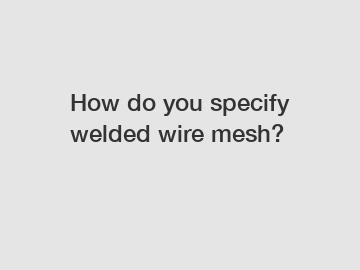How do you specify welded wire mesh?
How do you specify welded wire mesh?
If you are involved in construction or landscaping projects, you have probably come across the term "welded wire mesh." This versatile material is commonly used in a wide range of applications, including reinforcing concrete, fencing, and animal enclosures. However, specifying the right type of welded wire mesh for your project can be a daunting task, especially if you are not familiar with its various properties and configurations. In this article, we will explore the key factors to consider when specifying welded wire mesh, ensuring that you make an informed decision for your specific needs.
1. Wire Gauge and Mesh Size:

One of the essential aspects to consider when specifying welded wire mesh is the wire gauge and mesh size. Wire gauge refers to the thickness of the wire, while mesh size refers to the spacing between the wires. These factors determine the strength, flexibility, and overall durability of the mesh. Thicker wires and smaller mesh sizes typically result in a more rigid and robust mesh, while thinner wires with larger mesh sizes offer greater flexibility.
2. Coating and Material:
Welded wire mesh can be made from various materials, including galvanized steel, stainless steel, and vinyl-coated steel. Each material offers distinct advantages and is suitable for different applications. Galvanized steel wire mesh, for example, provides excellent corrosion resistance and is often used in outdoor applications. Stainless steel mesh, on the other hand, is highly resistant to rust and is frequently specified in areas where aesthetics and durability are crucial. Vinyl-coated welded wire mesh offers added protection against rust and corrosion while providing improved visibility due to its colored coating.
3. Aperture Shape:
While the majority of welded wire mesh features square or rectangular openings, there are also options available with hexagonal or diamond-shaped apertures. The aperture shape can impact the functionality of the mesh in specific applications. For example, hexagonal wire mesh is commonly used for chicken coops and other animal enclosures, as it provides excellent protection while allowing proper airflow and visibility. Diamond-shaped apertures are often preferred for decorative purposes, such as trellises or garden fencing.
4. Roll Size and Dimensions:
When specifying welded wire mesh, it is crucial to consider the desired roll size and dimensions. The roll size will not only affect transportation logistics but also impact the ease of installation. Additionally, understanding the dimensions of the mesh can help ensure that it fits your project's requirements accurately. By considering factors such as roll width, roll length, and customized dimensions, you can minimize the need for additional cutting or splicing during installation.
In conclusion, specifying welded wire mesh requires careful consideration of wire gauge, mesh size, coating and material, aperture shape, and roll size and dimensions. By understanding these key factors, you can select the most suitable type of welded wire mesh for your construction or landscaping project. Whether you need a rigid and durable mesh for concrete reinforcement or a flexible solution for fencing applications, knowing how to specify welded wire mesh will help you achieve your desired results. So, next time you encounter a project that requires welded wire mesh, apply these considerations to ensure optimal performance and longevity.
Are you interested in learning more about stainless steel wire mesh panels, perforated galvanised sheet, stainless steel window screen mesh? Contact us today to secure an expert consultation!

Comments